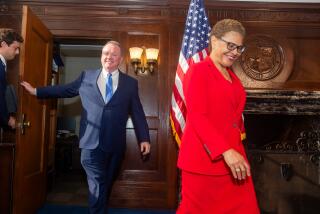Parks Reaffirms Support for Community Policing
- Share via
Amid continuing concern about his commitment to community-based policing, Los Angeles Police Chief Bernard C. Parks on Saturday told hundreds of citizen activists he is seeking to enhance that philosophy, not tear it down.
“We have a shared ownership in this,” Parks said in a speech at the fourth annual meeting of the LAPD’s Community-Police Advisory Boards. “We set up priorities together.”
Traditionally among the strongest supporters of the police, some members of the LAPD advisory panels--which were formed four years ago--say they fear Parks’ planned reassignment of community liaison officers to patrol duties will weaken community policing, instead of improving it as he contends. Moreover, some members say they believe the chief is trying to diminish their role and stature within the department.
Parks, however, told the crowd of about 800 police and neighborhood leaders that the work of the advisory panels “will remain a vital part” of the LAPD. But he asked that the members of the panels be “flexible” and “adaptable” as he tries to strengthen the community policing efforts and pushes other city departments to do more to make Los Angeles safer.
He said he is not trying to reduce their role in advising LAPD brass, but rather attempting to broaden the input the department receives from other members of the community.
In addition to the advisory panels, Parks said the LAPD needs to get feedback and direction from school groups, business associations and other segments of the community. As part of that move, Parks announced that, for the first time in the department’s history, he is creating an advisory panel made up of members from the city’s gay and lesbian community.
“The future does hold some changes for all of us,” he said.
Despite his upbeat message, the chief made little attempt to explain his controversial reorganization plan, which is at the heart of some activists’ worries.
Under his plan, community liaison officers--known as senior lead officers--will be reassigned to patrol, while sergeants, working larger areas, will be responsible for maintaining contacts with the neighborhood groups.
Parks has said repeatedly that the move is intended to beef up patrols and invigorate community policing by making everyone within the department responsible for community problem-solving, instead of just a select few.
During the summit, a number of city officials, including Mayor Richard Riordan, Police Commission President Edith Perez and City Councilman Mike Feuer, said they supported Parks’ leadership of the LAPD and his plans to improve community policing.
But some department supporters still were not convinced Saturday that Parks is taking the LAPD in the right direction.
“I don’t believe anyone agrees with what he’s doing for community policing,” said Leslie Yamashita, a community advisory panel member from Van Nuys. “Chief Parks is going back to the militaristic way of doing things. He hasn’t sought any input from the community. People are hot under the collar about this.”
After attending a morning session on the future of the community police advisory boards, Chris Williams said he is willing to give Parks’ plans a try.
“It’s his baby,” said Williams, who sits on an advisory panel in the LAPD’s Pacific Division. “We don’t have much of a choice anyway.”
Paul Oschmann, an advisory panel member from the west San Fernando Valley, agreed that the chief should be given a chance to run the department as he sees fit.
“We’re not here to manage the department,” he said. “We’re here as advisors. He’s the one who’s going to be held responsible for what he does.”
More to Read
Sign up for Essential California
The most important California stories and recommendations in your inbox every morning.
You may occasionally receive promotional content from the Los Angeles Times.










